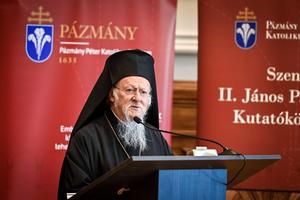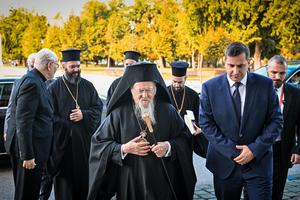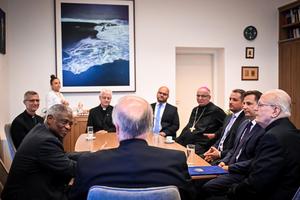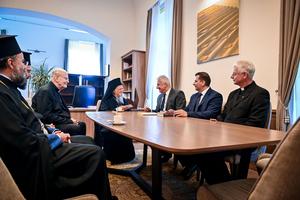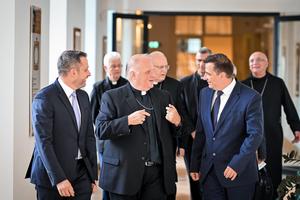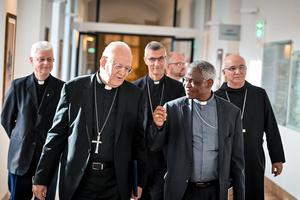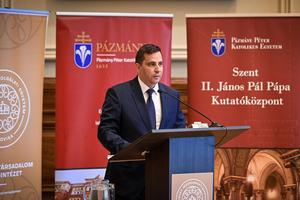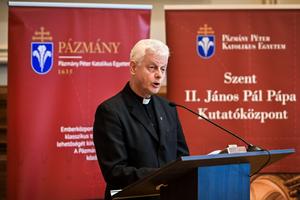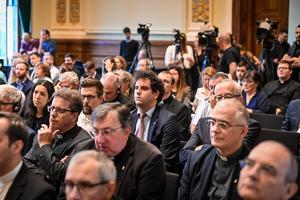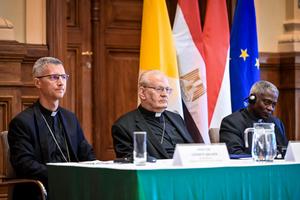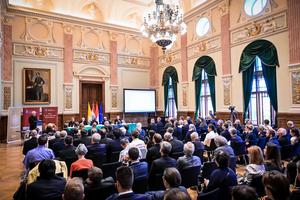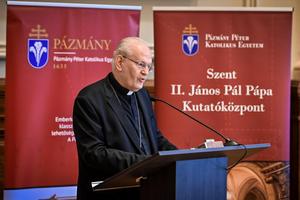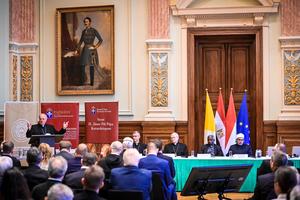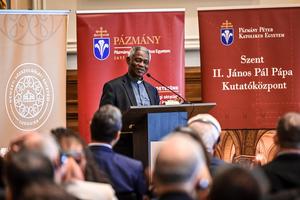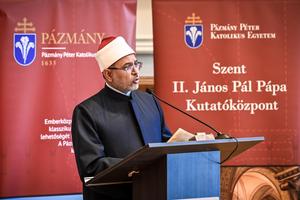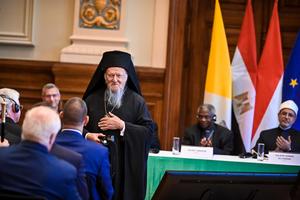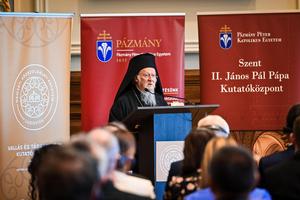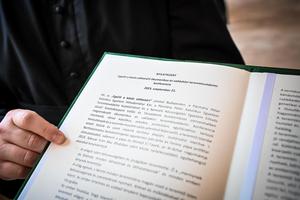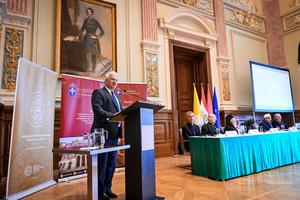On September 21, His Holiness Bartholomew I, the Ecumenical Patriarch of Constantinople, arrived in Hungary at the invitation of the Pannonhalma Archabbey. The central focus of the Orthodox Church leader's five-day visit was on ecumenical and interfaith dialogue, as well as the promotion of peace-building. On the final day of his stay in Hungary, September 25, the Patriarch delivered a lecture on the protection of the created world at the event titled "Together for Our Common Home" at the Ludovika Campus Main Building. The ecumenical and interfaith creation protection conference was jointly organized by Ludovika University of Public Service (LUPS), the Faculty of Theology of Pázmány Péter Catholic University (PPKE), the Creation Protection Research Institute of PPKE, and the Religion and Society Research Institute (VTKI) of Eötvös József Research Center.
"Our institution places all its educational and scientific activities at the service of the common good," emphasized Gergely Deli, the Rector of LUPS, in his welcoming address. Quoting legal scholar Zoltán Magyary, he underscored that "public administration is not about the power of individuals over others but about the organisation of the nation's common goals and the satisfaction of its common needs. The legitimacy and measure of public administration lie in serving the people and the nation." He pointed out that LUPS, through the Creation, Religion, and Society Research Institute (VTKI), deeply studies the phenomena through which religion influences society. Handling global challenges is not only a national interest but also an international one, he said, highlighting the importance of international relations at the religious level. Referring to Hungary's Fundamental Law, he stated, "The state and religious communities can collaborate in achieving common goals." He added that the recent visit of Pope Francis and Patriarch Bartholomew I to Hungary has strengthened these efforts, including the support for families and marriage, peace initiatives, and the protection of creation and the environment.
Kuminecz Géza, the Rector of PPKE, emphasised in his address that sustainable societies built on Christian brotherly love are essential. He believed that sustainability encompasses not only economic and environmental aspects but also spiritual and mental dimensions. Therefore, environmental protection is respecting the harmony between God, humanity, and nature. He explained that thanks to Pope Francis, a reform in the regulation of ecclesiastical universities had placed interdisciplinary methods and openness to theological dialogue at the centre of education. He highlighted the collaboration between LUPS and PPKE, emphasising that both institutions work together for the common good of Hungary. He noted that they have previously organised joint conferences and workshops and are collaborating in the creation protection program supported by the Ministry of Technology and Industry.
According to Erdő Péter, Cardinal Archbishop of Esztergom-Budapest, who referred to Saint Benedict's motto "Ora et labora," meaning "Pray and work," this is a time when we must renew our relationship with God. He pointed out that when we talk about environmental protection, we are talking about the protection of the created world. He emphasised that environmental protection often exceeds our human capabilities because we do not fully understand all the laws of the created world. He stressed the importance of praying for researchers and technical innovators to help recognise the truth and apply it in practice.
No one exists in isolation and independence; only conscientious, coordinated, and collective responses can benefit the community, highlighted Ecumenical Patriarch Bartholomew I in his presentation. He pointed out that we must leave a more peaceful, just, and sustainable world for future generations. According to him, the global response to climate change includes listening to and accepting the arguments of other religious communities, as well as cooperating with various scientific disciplines. He stated that humans cannot play God in everyday life, and politics cannot be derived from science.
He believed that the greatest threat to our planet is not the pandemic but the failure to halt climate change. Therefore, sustainability can only be achieved through drastic lifestyle changes. He also noted that in recent decades, the spiritual and emotional dimension of environmental protection has come to the forefront because the reverence for creation is an integral part of our faith. He explained that the ecological crisis is not just a political or scientific challenge; it can only be solved by changing people's perspectives. The strength of ecumenical dialogue, he said, lies in looking beyond ourselves, our denominations, and our religions because preserving our common home is a shared task.
For nearly fifty years, the protection of the environment, climate change, water security, and biodiversity have been constant topics in the daily news, pointed out Hidvéghiné Pulay Brigitta, a scientific researcher at the Creation Protection Research Institute of PPKE, in her introduction. She recalled that churches have always been concerned with protecting creation and have provided guidance on how people should interact with the world that God has given us. She emphasised that, in addition to action, there is a need for inner transformation and moral renewal.
Michael Wallace Banach, the Apostolic Nuncio, said this is a time to renew our relationship with God in a world altered by the pandemic. He noted that poverty has increased, wars have resumed, and climate change, floods, and wildfires are causing immense damage in our changed world. Therefore, we need to change our way of life.
The mission of creation protection is for humanity, entrusted by God, to cultivate the world with responsibility, said Zsolt Semjén. He stated that, like a garden, humans must care for the world, which God placed as a garden for them. He pointed out two sins against the Creator: the unbridled profit hunger of the industrial lobby, which wants to turn the world into an industrial park and a resource extraction site, and neglecting the garden altogether. He explained that humans cannot exist without nature, but philosophically, nature gains its unique meaning within humans. Therefore, it is a mistake to exclude humans from nature as its enemies.
Peter Turkson, born in Ghana and President of the Pontifical Academy of Sciences, referred to the teachings of Pope VI, John Paul II, Benedict XVI, and Pope Francis on supporting the poor and the importance of charity, as well as integral ecology. He stated that God created humans in His image and likeness from the earth, but He also gave them His soul, making humans integral beings.
Salama Gomaa Ali Daoud, the Rector of Al-Azhar University in Cairo, emphasised the importance of dialogue between religions. He noted that Islam and Christianity share values such as truth, freedom, support for the poor, and respect for diversity. He highlighted that inciting injustice, anger, and hatred, common to all religions, is forbidden. He emphasised the importance of world peace and the need to end conflict in all areas of life.
Humanity bears responsibility for the entire created world, referring to the words of theologian Albert Schweitzer, said Tamás Fabinyi, the Lutheran Bishop and President. He expressed satisfaction that creation protection and ecological awareness are gaining more ground. He stressed that the spirit of the solemn declaration aligns with several statements of the World Council of Churches, which brings together Protestant and Orthodox churches worldwide and collaborates with the Holy See. Referring to the 2004 declaration by Bartholomew I, it was emphasised that there is no just war, only a just peace, and every war brings ecological devastation, which disproportionately endangers the poorest.
The attendees also accepted a solemn declaration on the importance of shared responsibility for the created world.
In the second part of the conference, presentations were given by John Chryssavgis, an American Orthodox theologian; Markus Vogt, a Catholic theologian from the University of Munich; Brigadier General József Padányi, Head of the Military Technical Doctoral School of LUPS, Dr Elvira Pataki, Associate Professor at the Institute of Classical and Romance Languages at PPKE, Tamás Kodácsy, the Chief Scientific Officer of the Creation Protection Research Institute at Károli Gáspár University of the Reformed Church, and Tamás Béres, Head of the Systematic Theology Department at the Evangelical Theological Seminary.
Text: Réka Zsuzsanna Szabó
Photo: Dénes Szilágyi
